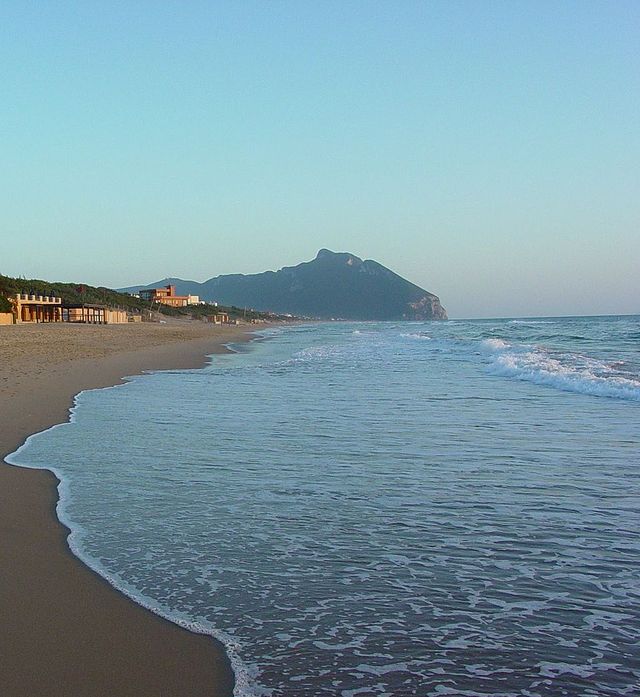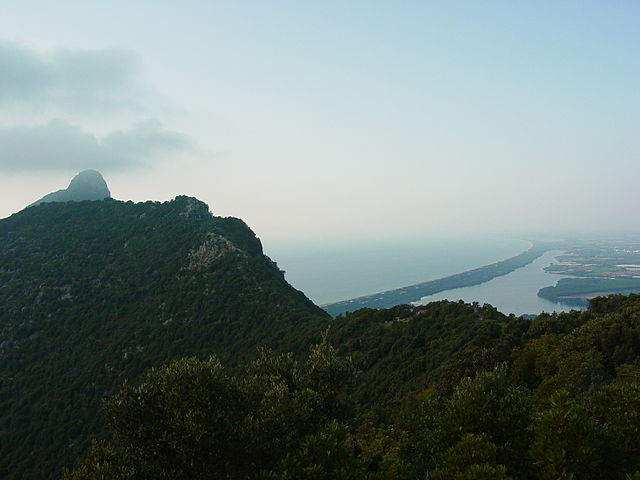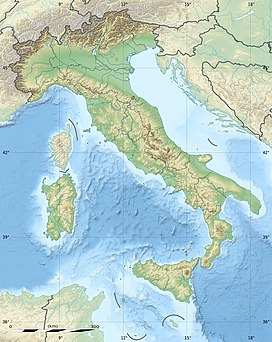Mount Circeo
Mountain in Italy From Wikipedia, the free encyclopedia
Monte Circeo or Cape Circeo (Italian: Promontorio del Circeo [promonˈtɔːrjo del tʃirˈtʃɛːo], Latin: Mons Circeius) is a mountain promontory that marks the southwestern limit of the former Pontine Marshes, located on the southwest coast of Italy near San Felice Circeo. At the northern end of the Gulf of Gaeta, it is about 5 kilometres (3.1 mi) long by 1.5 kilometres (0.93 mi) wide at the base, running from east to west and surrounded by the sea on all sides except the north. The land to the northeast is the former ancient Pontine Marshes. Most of the ancient swamp has been reclaimed for agriculture and urban areas.
| Mount Circeo | |
|---|---|
 Mount Circeo as seen from Terracina, Italy | |
| Highest point | |
| Prominence | 541 m (1,775 ft) |
| Coordinates | 41°14′00″N 13°03′00″E |
| Geography | |
| Location | San Felice Circeo, Lazio, Italy |



The mountain, the coastal zone as far north as Latina, including the only remaining remnant of the swamp, and two of the Pontine Islands offshore, Zannone and Ponza, have been included in the Circeo National Park.
Geology
Although a headland, it was not formed by coastal erosion – as headlands are usually formed – but is a remnant of the orogenic processes that created the Apennines. The entire coast of Lazio, on which the mountain and the marsh are located, was a chain of barrier islands that was formed on a horst and made part of the mainland by sedimentation of the intervening graben.
The mountain is composed mostly of marl and sandstone from the Paleogene and of limestone from the lower Early Jurassic.
The mountain features several caves, including the Goats Cave and the Guattari Cave.
Prehistory
In 1939, the skull of a Neanderthal man was found in the Guattari Cave by a team led by Alberto Carlo Blanc. Several other findings also show that the mountain was inhabited in prehistorical times.[1][2] In May 2021, the remains of 9 Neanderthal men were discovered in the same Guattari cave. The Minister of Culture in Italy declared the site to be one of the most significant in the world regarding the Neanderthal period.[3][4]
History
Today
Mount Circeo is today included in the Circeo National Park, established in 1934 on 5,616 ha (56.16 km2; 13,880 acres; 21.68 sq mi) over the territories of Latina, Sabaudia, San Felice Circeo and Zannone Island (minor island of Ponziane Archipelago).
References
External links
Wikiwand in your browser!
Seamless Wikipedia browsing. On steroids.
Every time you click a link to Wikipedia, Wiktionary or Wikiquote in your browser's search results, it will show the modern Wikiwand interface.
Wikiwand extension is a five stars, simple, with minimum permission required to keep your browsing private, safe and transparent.

